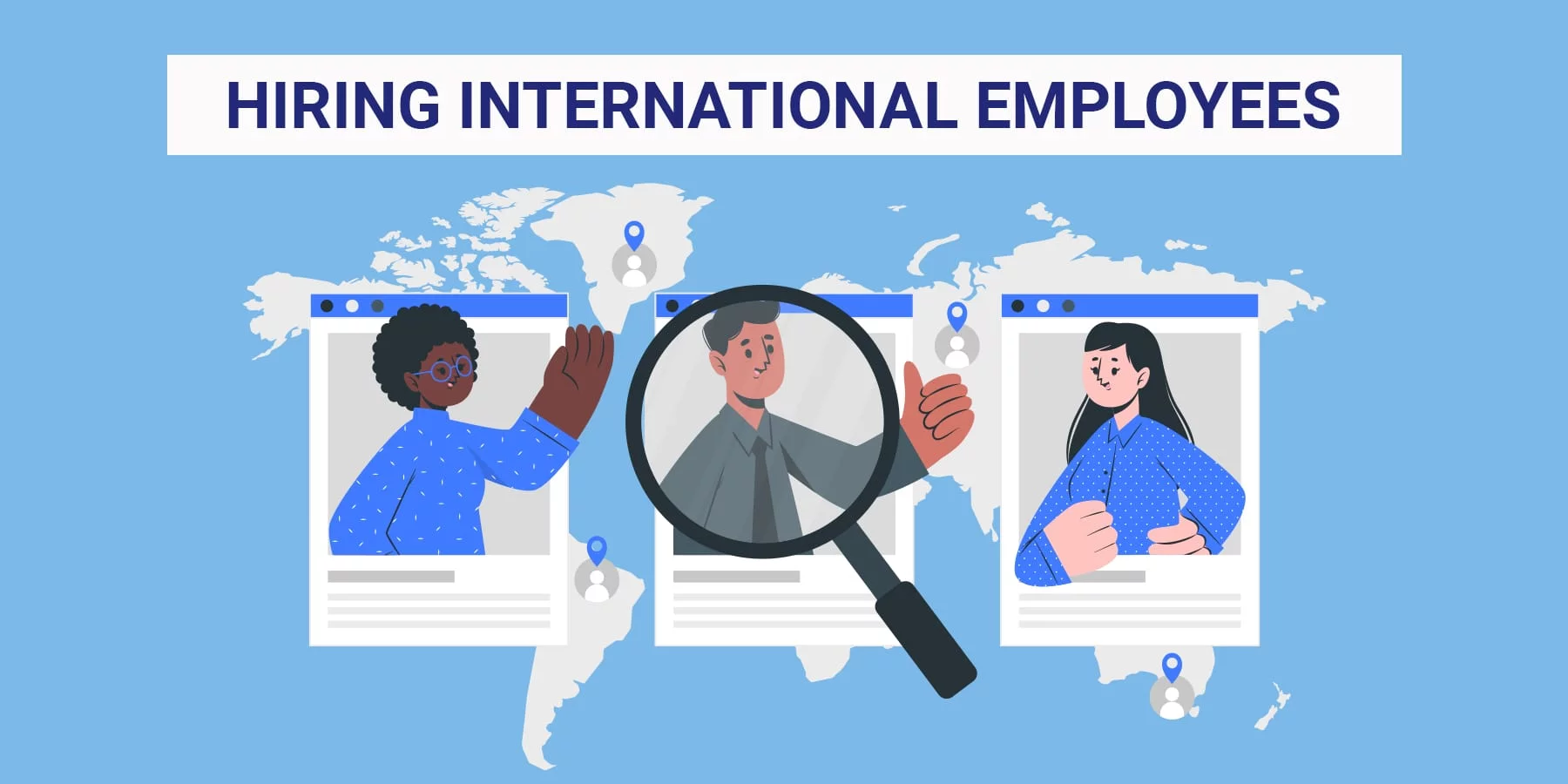
Navigating the realm of What Are The Legal Risks Associated With International Hiring?can be a high-stakes gamble fraught with legal pitfalls that can cripple even the most seasoned businesses. The allure of global talent pools is undeniable, yet behind the sceneslie intricate webs of legal intricacies and potential liabilities. From complex visa regulations to varying employment laws across borders, the risks loom large.
In this comprehensive exploration, uncover the minefield of legal challenges associated with international hiring. Dive deep into the nuanced landscape of labor laws, immigration regulations, and compliance requirements. Arm yourself with the knowledge and strategies necessary to mitigate these risks, ensuring a solid foundation for successful global talent acquisition while safeguarding your organization against potential legal setbacks.
5 Risks Of Hiring International Talent Without A Local Employment Framework
Hiring international talentcan bring a wealth of diverse perspectives, skills, and experience to your company. It's crucial to establish a robust local employment framework to ensure compliance with local laws, protect your businessfrom legal liabilities, and foster a positive work environment for your international employees.
Here are five significant risks you may face if you hire international talent without a proper local employment framework:
1. Intellectual Property Protection Challenges -International employees may possess valuable intellectual property (IP) rights, such as inventions, trade secrets, or creative works. Without a local employment framework, you may inadvertently infringe on these rights or fail to protect your own company's IP assets. A local expert can help you establish clear IP ownership and confidentiality agreements.
2. Employer/Employee Liability and Insurance Gaps -International employees may face unique workplace risks, such as language barriers, cultural differences, and unfamiliarity with local safety regulations. Without proper insurance coverage and employer liability protection, your company could face significant financial burdens in the event of accidents, injuries, or discrimination claims.
3. Employment Agreement Pitfalls -Employment agreements form the foundation of the employer-employee relationship. Without a proper local employment framework, you may inadvertently enter into agreements that conflict with local laws or fail to protect your company's interests. A local expert can help you draft legally sound employment agreements tailored to the specific requirements of the country where you're hiring.
4. Local Compliance Failures -Each country has its own unique set of employment laws and regulations governing hiring, termination, work hours, compensation, benefits, and discrimination. Failure to comply with these laws can result in legal challenges, fines, and potential criminal charges for your company. A local employment framework ensures you stay abreast of changing regulations and implement compliant practices.
5. Improper Worker Classification -Misclassifying international workers as independent contractors or exempt employees can lead to significant legal and financial consequences. Without proper classification, employees may be denied benefits, overtime pay, and other protections under local labor laws. This can expose your company to lawsuits, fines, and reputational damage.
To mitigate these risks and ensure a successful international hiring experience, consider partnering with a local employment law expert or utilizing a global employment management services provider. These professionals can provide guidance on compliance, documentation, payroll, benefits, and cultural integration, ensuring a smooth transition for your international employees.
Contractual Issues With The Hiring Arrangement
Hiring employees, whether domestic or international, involves a complex set of legal and contractual considerations. Contractual issues can arise from various aspects of the hiring arrangement, including:
Immigration And Visa Compliance
When hiring international employees, employers must ensure compliance with immigration laws and visa requirements. This may involve obtaining work visas, sponsoring employees for green cards, and maintaining accurate records. Failure to comply with immigration regulations can result in fines, deportation of employees, and reputational harm.
Termination And Severance Provisions
Termination clauses should be clear and consistent with local laws. They should specify the grounds for termination, notice periods, severance packages, and post-employment restrictions. Improper termination or failure to provide adequate severance can lead to legal disputes and reputational damage.
Non-Compete Agreements And Trade Secrets
Employers may seek to protect their confidential information and proprietary knowledge by requiring employees to sign non-compete agreements. These agreements must be carefully drafted to be legally enforceable and comply with local laws. Employers must also take appropriate measures to protect trade secrets, such as maintaining confidentiality policies and procedures.
Compliance With Local Laws
Employers must adhere to all applicable labor laws and regulations, including those governing minimum wage, overtime pay, working hours, rest periods, discrimination, and safety standards. Failure to comply with these laws can result in legal challenges, fines, and potential criminal charges.
Misclassification Of Employees
Employers must correctly classify workers as either employees or independent contractors. Misclassification can have significant legal consequences, such as tax liabilities, eligibility for benefits, and protections under labor laws. Improper classification can expose the employer to lawsuits, fines, and reputational damage.
Improper Offer Letter Or Employment Agreement
The offer letter or employment agreement serves as the foundation of the employer-employee relationship. It should clearly outline the terms and conditions of employment, including job duties, compensation, benefits, working hours, termination provisions, and confidentiality obligations. Ambiguous or incomplete agreements can lead to misunderstandings, disputes, and potential legal challenges.
To Minimize Contractual Risks Associated With Hiring Arrangements, Employers Should:
- Provide Training and Education -Educate managers and supervisors on employment law compliance and best practices for managing employees.
- Maintain Accurate Records -Keep meticulous records of employment-related documents, including contracts, payroll, and performance evaluations.
- Establish Policies and Procedures -Implement clear policies and procedures for hiring, onboarding, termination, and dispute resolution.
- Classify Employees Properly -Accurately determine whether workers are employees or independent contractors.
- Draft Clear and Comprehensive Contracts -Use clear and unambiguous language in offer letters and employment agreements.
- Seek Legal Counsel -Consult with an employment law attorney to ensure compliance with local laws and regulations.
Diverse Intellectual Property Ownership Laws
Intellectual property (IP) laws vary significantly across countries, creating a complex and often challenging landscape for businesses operating internationally. Understanding these diverse IP ownership laws is crucial for protecting your company's innovations, inventions, and creative works.
1. Copyright Protection - Copyright protection extends to original works of authorship, including literary works, musical works, artistic works, and films. The duration of copyright protection varies from country to country, but generally lasts for the life of the author plus an additional 50 to 70 years.
2. Patent Protection - Patents grant exclusive rights to inventions for a limited period, typically 20 years from the filing date. Patentable inventions must be novel, non-obvious, and have industrial applicability.
3. Trademark Protection - Trademarks protect distinctive signs or symbols used to identify and distinguish the source of goods or services. Trademarks can be registered and protected for an indefinite period as long as they are used in commerce.
4. Trade Secret Protection - Trade secrets are confidential information that gives a businessa competitive advantage. Unlike patents and trademarks, trade secrets do not require registration and can be protected indefinitely as long as they are kept secret.
Navigating Diverse IP Ownership Laws
To effectively navigate diverse IP ownership laws, businesses should consider the following strategies:
- Monitor IP Landscape -Continuously monitor the IP landscape in relevant jurisdictions to stay abreast of changes in laws and regulations.
- Implement IP Protection Measures -Implement strong IP protection measures, such as confidentiality agreements, non-compete agreements, and access controls, to safeguard your trade secrets and other confidential information.
- Protect IP Assets Early and Strategically -File for patents, trademarks, and copyrights promptly to establish your IP rights in key jurisdictions.
- Seek Local IP Counsel -Engage local IP counsel in each jurisdiction where you operate to stay informed about applicable IP laws and regulations.
- Conduct Thorough IP Due Diligence -Before entering into international agreements or partnerships, conduct thorough IP due diligence to identify and assess potential IP risks.
By adopting a proactive approach to IP management and seeking expert guidance, businesses can effectively protect their intellectual property assets and mitigate potential risks in the global marketplace.
Foreign Employment And Labor Protections
Foreign Employment and Labor Protections (FELP) are a set of laws and regulations that protect the rights of foreign workers. FELP laws are designed to ensure that foreign workers are treated fairly and are not discriminated against. They also provide protections for foreign workers’ wages, hours of work, and working conditions.
FELP laws vary from country to country, but they typically cover the following areas:
- Recruitment and placement -FELP laws regulate the recruitment and placement of foreign workers to ensure that they are not exploited or abused. They may require employers to obtain a license to recruit foreign workers and to provide them with accurate information about their job duties, wages, and working conditions.
- Wages and hours of work - FELP laws typically require employers to pay foreign workers the same wages and provide them with the same hours of work as domestic workers. They may also require employers to provide foreign workers with overtime pay and vacation time.
- Working conditions -FELP laws regulate working conditions for foreign workers to ensure that they are safe and healthy. They may require employers to provide foreign workers with adequate safety equipment and training, and to protect them from discrimination and harassment.
- Social security -FELP laws may require employers to provide foreign workers with social security benefits, such as health insurance and retirement savings.
- Dispute resolution -FELP laws typically provide mechanisms for foreign workers to resolve disputes with their employers. This may include labor courts, mediation, or arbitration.
FELP laws are important because they help to protect the rights of foreign workers and ensure that they are treated fairly. They also help to promote economic development by making it easier for countries to attract and retain foreign workers.
Here are some examples of FELP laws from around the world:
- The United States -The Migrant and Seasonal Agricultural Worker Protection Act (MSPA) protects the rights of migrant and seasonal agricultural workers in the United States. The MSPA requires employers to provide migrant and seasonal agricultural workers with housing, food, and transportation, and to pay them fair wages.
- Canada - The Temporary Foreign Worker Program (TFWP) regulates the employment of foreign workers in Canada. The TFWP requires employers to obtain a Labour Market Impact Assessment (LMIA) to ensure that hiring a foreign worker will not have a negative impact on the Canadian workforce.
- The European Union -The EU Directive on Posted Workers protects the rights of workers who are posted to another EU country for temporary work. The Directive requires employers to provide posted workers with the same wages and working conditions as domestic workers.
FELP laws are an important part of the global labor market. They help to protect the rights of foreign workers and ensure that they are treated fairly. They also help to promote economic development by making it easier for countries to attract and retain foreign workers.
Frequently Asked Questions About What Are The Legal Risks Associated With International Hiring?
What Are The Labor Law Considerations For Hiring International Employees?
Employers must comply with all applicable labor laws when hiring international employees, including those related to minimum wage, overtime pay, working hours, rest periods, discrimination, and safety standards. Failure to comply with these laws can result in legal challenges, fines, and potential criminal charges.
What Are The Legal Risks Associated With Misclassifying International Employees As Independent Contractors?
Misclassifying international employees as independent contractors can have significant legal consequences, such as tax liabilities, eligibility for benefits, and protections under labor laws. Employers should carefully assess the nature of the work and the level of control they exert over the employee to determine the appropriate classification.
What Are The Legal Considerations For Terminating An International Employee?
Termination procedures and severance packages for international employees may differ from those for domestic employees. Employers should follow the termination provisions outlined in the employment agreement and comply with applicable laws to avoid legal disputes.
Conclusion
The legal risks entwined with international hiring demand vigilant attention and proactive measures from businesses venturing into global recruitment. The intricate tapestry of varying laws, cultural disparities, and compliance obligations underscores the necessity for a meticulous and well-informed approach. Mitigating these risks necessitates comprehensive research, expert guidance, and a robust strategy that not only focuses on acquiring top talent but also prioritizes legal adherence and ethical employment practices across borders.
As organizations strive to harness the advantages of a global workforce, acknowledging, understanding, and effectively managing the legal risks associated with international hiring becomes a cornerstone of sustainable growth and success. By prioritizing legal compliance, embracing cultural diversity, and establishing clear frameworks, businesses can not only navigate the complexities but also leverage international talent while mitigating potential legal pitfalls, paving the way for a more resilient and thriving global presence.


